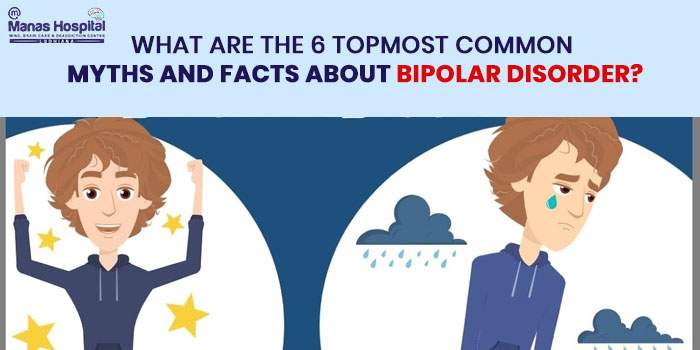
What are the 6 topmost common myths and facts about bipolar disorder?
Busting Myths About Bipolar Disorder
Presently, there are many Tv shows and movies that depict bipolar disorder. Although, that information is not enough to understand this mental disorder and many myths are revolving around it. No doubt, people do experience stress daily but with bipolar disorder, it is something else and severe. The typical mood swings pass down quickly but bipolar disorder cycles can last for weeks and months.
If bipolar patients do not seek psychiatric assistance on time, then there are high chances that the problem will get worse. With that said, it is important to understand the symptoms and facts about the condition, which will encourage people to get help.
Myth 1: Only one type of bipolar disorder is present
Fact: According to medical research, there is 7 type of bipolar disorder which are mentioned-below:
- Bipolar I – features at least 1 manic episode
- Bipolar II – features at least 1 hypomanic episode
- Other Specified Bipolar and Related Disorder
- Unspecified Bipolar and Related Disorder
- Bipolar and Related Due to Another Health Issue
- Substance or Medication-Induced Bipolar and Related Disorder
- Cyclothymic Disorder – features both hypomanic and depressive symptoms in rapid cycles
With that said, it becomes even more important to seek assistance and do not make assumptions on your own.
Myth 2: Bipolar Disorder occurrence is Rare
Fact: Bipolar disorder is a common mental health issue. Although the reason for bipolar disorder is still not known. It is believed that different factors can increase the risk or make you have the first episode:
- Someone in your family has bipolar disorder.
- Increased stress levels and that too for a long time or childhood abuse.
- Research has found that activation of chemical signals or subtle changes in the brain can trigger issues.
- Excess alcohol or drug consumption
Myth 3: Bipolar Disorder makes the person moody
Fact: Bipolar disorder high and lows are not the same as mood swings. Patients with this problem experience severe changes in their sleep, activity, and energy level. So, make sure that you do not consider them the same as mood fluctuations.
Understand that, diagnosis of rapid-cycling bipolar disorder will take a lot of time. The psychiatrist will look for different symptoms and what actually makes the condition extreme & how long they last.
Myth 4: Bipolar disorder is categorized as mania
Fact: A bipolar patient goes through a range of emotions like mood changes which include depression, hypomania, and mania. A person must have experienced mania or hypomania to have bipolar disorder. Although every patient is different from others, so are the symptoms.
A person rarely experiences hypomanic and manic symptoms in one single episode along with depressive symptoms. In medical terms, it is known as mixed features. It is possible that a person feels extremely sad along with being extremely energetic.
Myth 5: Mania Episode in fun and exciting
Fact: During mania, the person might feel the zeal to do more work as compared to normal. Moreover, they can continue their day without falling asleep for a long time. On the other hand, some people experience extreme mood swings, feeling out of control, irritable and restless over everything.
In some cases, the person has increased energy of mania, after the initial episode of depression. In such cases, they are not able to control their feelings, and their behavior changes unpredictably. Not only that, but they behave impulsively and try to make decisions which prove risky & harmful for both their professional and personal life. It will make it difficult for them to control the situation for months and years. So, the situation is not just about the fun, it is extremely stressful.
Myth 6: Stop the medications, once the situation get in control
Fact: At present, medications are the only and most effective choice to control the situation. You should not try to become a doctor and it is better to consult the doctor before you want to stop the consumption of medications. Through medications and suggested therapy sessions by the doctor the risk of future episodes is prevented and symptoms are controlled. So, make sure to seek your psychiatric assistance on what step you need to take next, to control the problem.






